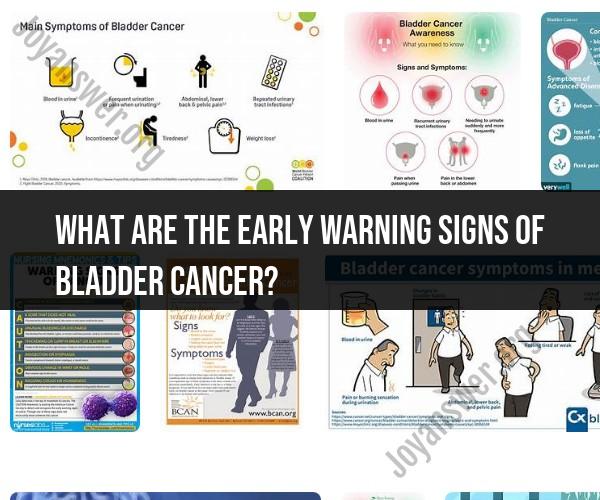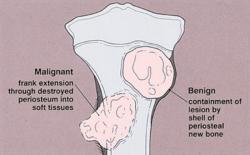What are the early warning signs of bladder cancer?
Bladder cancer, like many types of cancer, may not cause noticeable symptoms in its early stages. However, when symptoms do appear, they can serve as early warning signs of the disease. It's essential to recognize these symptoms and seek medical attention promptly. Some common early warning signs of bladder cancer include:
Hematuria: Hematuria is the most common early symptom of bladder cancer. It involves the presence of blood in the urine. The urine may appear pink, red, or brown. While hematuria can result from various non-cancerous conditions, it should always be evaluated by a healthcare professional.
Frequent Urination: An increased need to urinate, even when the bladder is not full, can be an early sign of bladder cancer. Frequent urination may be accompanied by a sense of urgency to urinate.
Painful Urination: Pain or a burning sensation during urination, often indicative of an infection or other urinary tract issues, can also be an early symptom of bladder cancer.
Lower Back Pain: Some individuals with bladder cancer experience lower back pain, particularly when the cancer has spread to nearby tissues or organs.
Pelvic Pain: Pain in the pelvic area can occur in the presence of bladder cancer, especially as the disease progresses.
Unexplained Weight Loss: Sudden and unexplained weight loss can be a general sign of various medical conditions, including cancer.
Fatigue: Persistent fatigue that is not related to exertion or lack of sleep can be an early warning sign of various illnesses, including bladder cancer.
It's crucial to note that these symptoms are not unique to bladder cancer and can result from other, often non-cancerous, health issues. However, if you experience any of these symptoms, especially if they are persistent or worsen over time, it is important to consult a healthcare provider for a thorough evaluation and appropriate diagnostic tests. Early detection and treatment of bladder cancer can significantly improve outcomes, so it's best not to delay seeking medical advice if you have concerns. Your healthcare provider may recommend tests such as urine analysis, imaging, or cystoscopy to assess your condition.
Early Warning Signs of Bladder Cancer: What to Look For
The early warning signs of bladder cancer can be subtle and easy to miss. That's why it's important to be aware of the symptoms and to see a doctor if you experience any of the following:
- Blood in your urine (hematuria): This is the most common sign of bladder cancer and may appear as bright red, rusty, or cola-colored blood.
- Painful urination: This can be a sign that the tumor is blocking the flow of urine or irritating the bladder lining.
- Frequent urination: This can be caused by the tumor putting pressure on the bladder or by the body's attempt to flush out the tumor.
- Difficulty urinating: This can be a sign that the tumor is blocking the flow of urine.
- Pelvic pain: This can be caused by the tumor itself or by the pressure it puts on nearby organs.
If you experience any of these symptoms, it's important to see a doctor right away. Bladder cancer is most treatable when it's caught early.
Recognizing Symptoms and Risk Factors for Bladder Cancer
In addition to the early warning signs listed above, there are a number of risk factors for bladder cancer. These include:
- Age: Bladder cancer is more common in people over the age of 65.
- Gender: Men are more likely to develop bladder cancer than women.
- Smoking: Smoking is the leading risk factor for bladder cancer.
- Exposure to certain chemicals: People who work with certain chemicals, such as aromatic amines and arsenic, are at increased risk for bladder cancer.
- Family history of bladder cancer: People with a family history of bladder cancer are at increased risk.
If you have any of these risk factors, it's important to talk to your doctor about your risk of bladder cancer and whether you should be screened regularly.
Diagnostic Tests and Screening for Bladder Cancer Detection
If you experience any of the symptoms of bladder cancer or if you have any of the risk factors, your doctor will likely order some tests to rule out other possible causes and to diagnose bladder cancer if it is present.
Some common diagnostic tests for bladder cancer include:
- Urinalysis: This test checks your urine for blood cells, white blood cells, and other abnormalities.
- Cystoscopy: This is a minimally invasive procedure in which a thin tube with a camera is inserted into the urethra and bladder to look for tumors or other abnormalities.
- Biopsy: If a tumor is found during cystoscopy, your doctor may take a small sample of tissue (biopsy) for testing.
Treatment Options and Strategies for Bladder Cancer
The treatment for bladder cancer depends on the stage and type of cancer, as well as the patient's overall health. Some common treatment options include:
- Surgery: Surgery to remove the tumor is the most common treatment for bladder cancer.
- Radiation therapy: Radiation therapy uses high-energy rays to kill cancer cells.
- Chemotherapy: Chemotherapy uses drugs to kill cancer cells.
- Immunotherapy: Immunotherapy helps the body's own immune system fight cancer cells.
Supportive Care and Coping with a Bladder Cancer Diagnosis
A bladder cancer diagnosis can be a difficult and overwhelming experience. There are a number of resources available to help patients and their families cope with the diagnosis and treatment.
Some supportive care resources include:
- Counseling: Counseling can help patients and their families cope with the emotional challenges of a bladder cancer diagnosis.
- Support groups: Support groups can provide patients and their families with an opportunity to connect with others who are going through the same thing.
- Financial assistance: There are a number of financial assistance programs available to help patients with the cost of bladder cancer treatment.
If you have been diagnosed with bladder cancer, it's important to reach out for support. There are many people who care about you and want to help you through this difficult time.












